Project Management: The Role of Experience and Reflection in Learning
VerifiedAdded on 2023/06/08
|6
|1280
|158
Essay
AI Summary
This essay explores the critical relationship between experience and learning within the context of project management, particularly in complex projects. It examines the importance of reflection, drawing upon the perspectives of Dewey, Crawford, and Hoffman, to highlight how not all experiences lead to beneficial learning. The discussion covers past researches on experiential learning, theoretical approaches to competency, and the significance of reflection in enhancing professional skills. It emphasizes the role of managers in fostering a reflective practice among employees to improve their capabilities and address knowledge gaps, ultimately leading to more effective project execution and professional development. The essay concludes that consistent reflection on performance is crucial for continuous learning and improvement in project management.
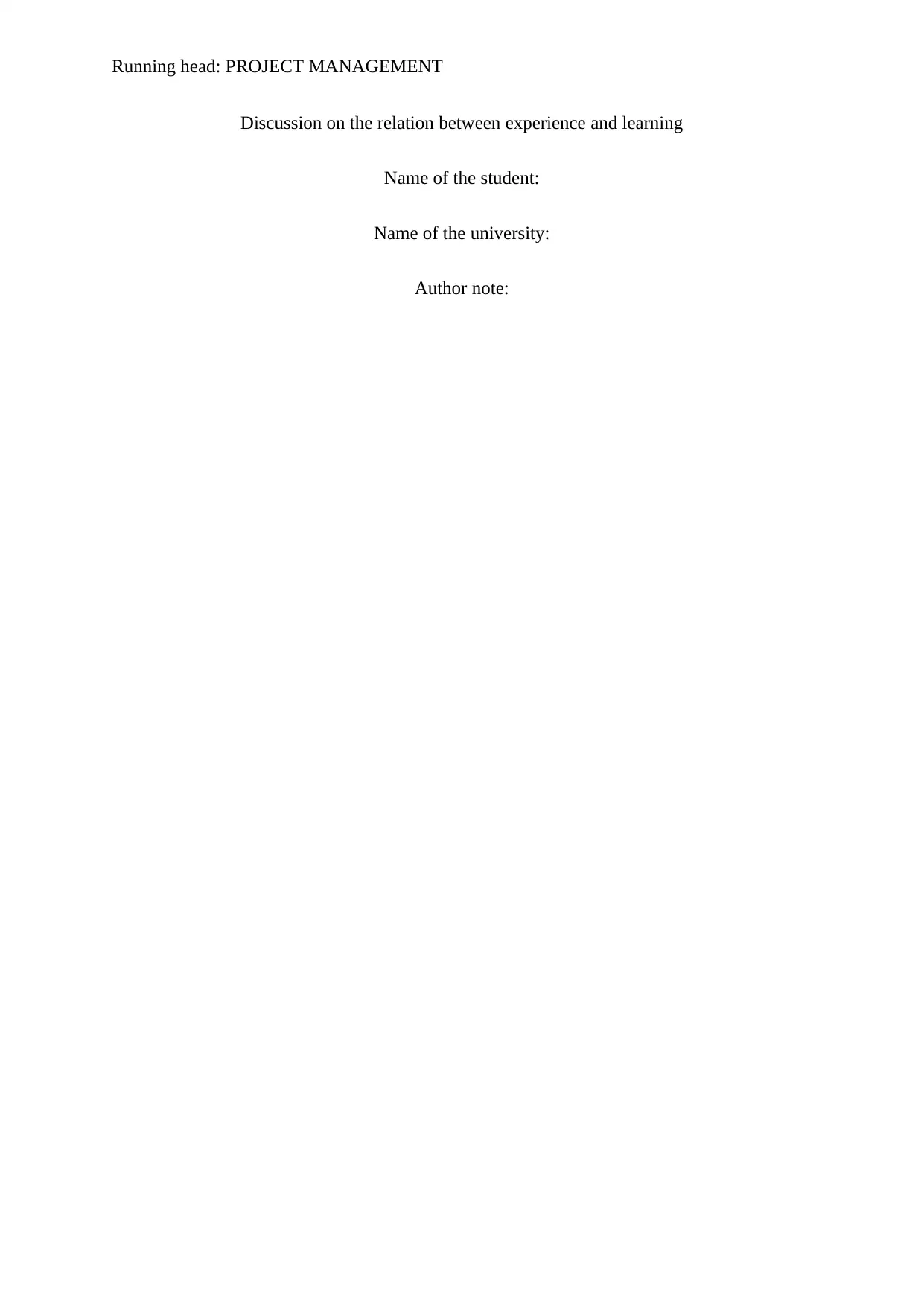
Running head: PROJECT MANAGEMENT
Discussion on the relation between experience and learning
Name of the student:
Name of the university:
Author note:
Discussion on the relation between experience and learning
Name of the student:
Name of the university:
Author note:
Paraphrase This Document
Need a fresh take? Get an instant paraphrase of this document with our AI Paraphraser
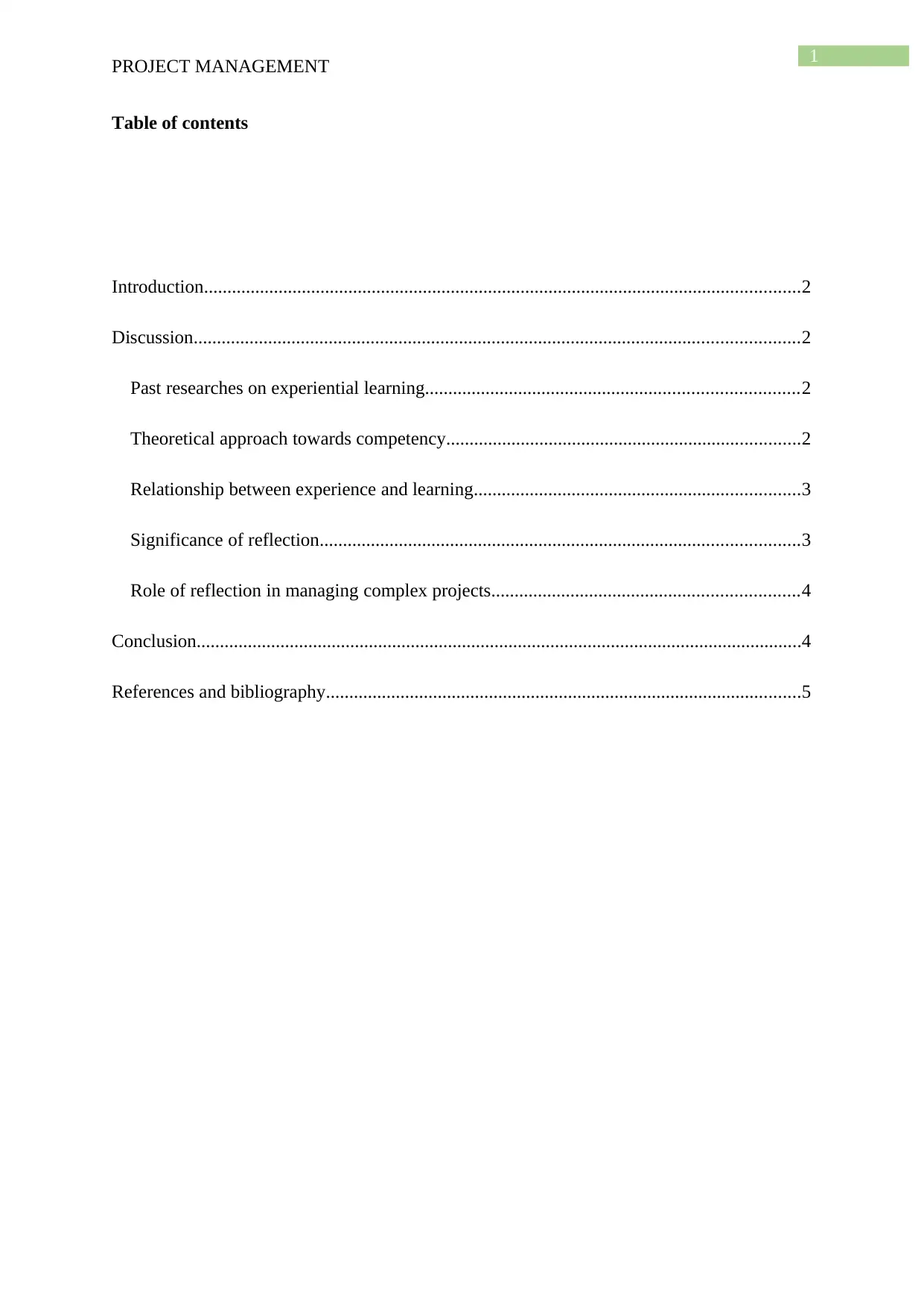
1
PROJECT MANAGEMENT
Table of contents
Introduction................................................................................................................................2
Discussion..................................................................................................................................2
Past researches on experiential learning................................................................................2
Theoretical approach towards competency............................................................................2
Relationship between experience and learning......................................................................3
Significance of reflection.......................................................................................................3
Role of reflection in managing complex projects..................................................................4
Conclusion..................................................................................................................................4
References and bibliography......................................................................................................5
PROJECT MANAGEMENT
Table of contents
Introduction................................................................................................................................2
Discussion..................................................................................................................................2
Past researches on experiential learning................................................................................2
Theoretical approach towards competency............................................................................2
Relationship between experience and learning......................................................................3
Significance of reflection.......................................................................................................3
Role of reflection in managing complex projects..................................................................4
Conclusion..................................................................................................................................4
References and bibliography......................................................................................................5
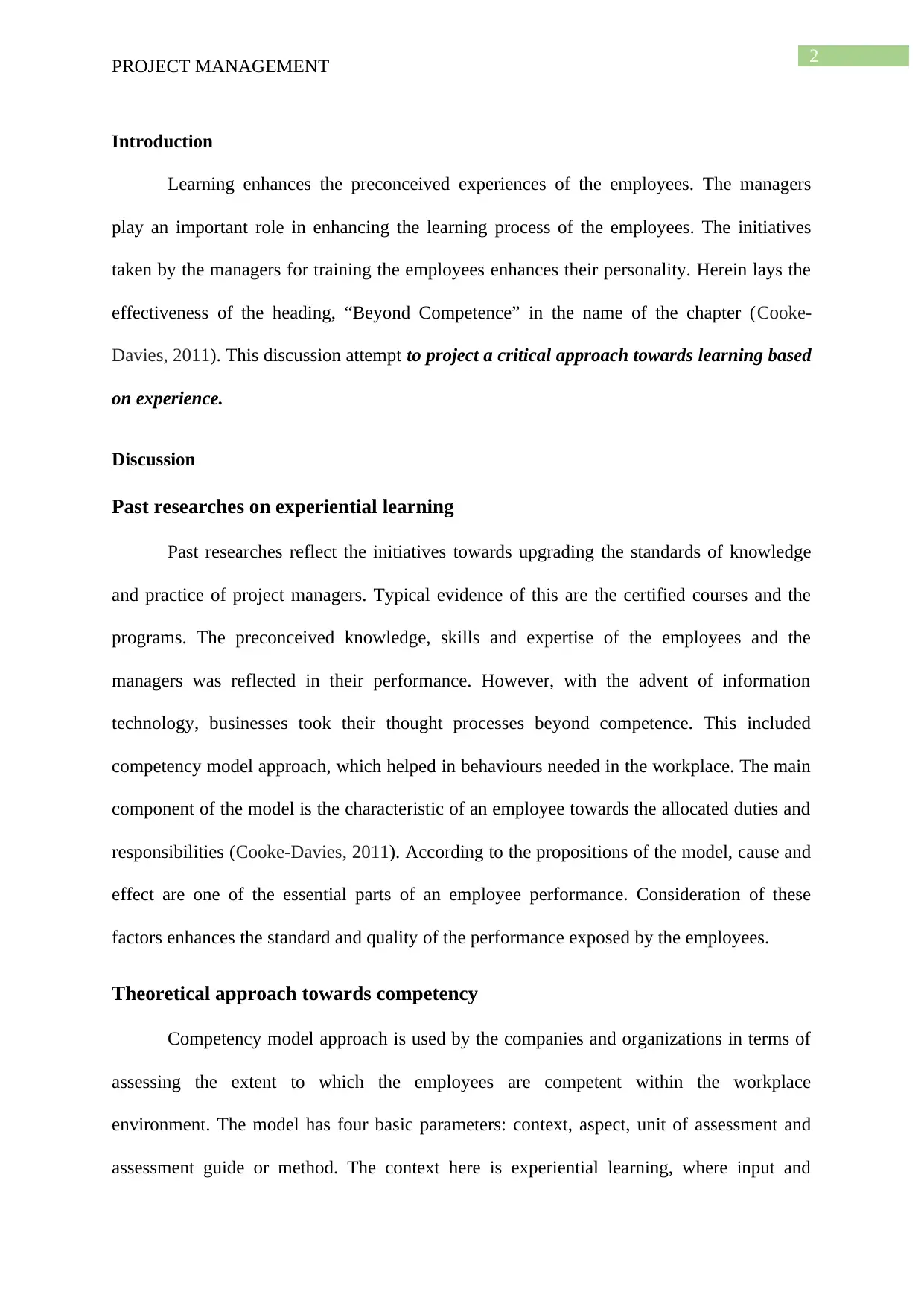
2
PROJECT MANAGEMENT
Introduction
Learning enhances the preconceived experiences of the employees. The managers
play an important role in enhancing the learning process of the employees. The initiatives
taken by the managers for training the employees enhances their personality. Herein lays the
effectiveness of the heading, “Beyond Competence” in the name of the chapter (Cooke-
Davies, 2011). This discussion attempt to project a critical approach towards learning based
on experience.
Discussion
Past researches on experiential learning
Past researches reflect the initiatives towards upgrading the standards of knowledge
and practice of project managers. Typical evidence of this are the certified courses and the
programs. The preconceived knowledge, skills and expertise of the employees and the
managers was reflected in their performance. However, with the advent of information
technology, businesses took their thought processes beyond competence. This included
competency model approach, which helped in behaviours needed in the workplace. The main
component of the model is the characteristic of an employee towards the allocated duties and
responsibilities (Cooke-Davies, 2011). According to the propositions of the model, cause and
effect are one of the essential parts of an employee performance. Consideration of these
factors enhances the standard and quality of the performance exposed by the employees.
Theoretical approach towards competency
Competency model approach is used by the companies and organizations in terms of
assessing the extent to which the employees are competent within the workplace
environment. The model has four basic parameters: context, aspect, unit of assessment and
assessment guide or method. The context here is experiential learning, where input and
PROJECT MANAGEMENT
Introduction
Learning enhances the preconceived experiences of the employees. The managers
play an important role in enhancing the learning process of the employees. The initiatives
taken by the managers for training the employees enhances their personality. Herein lays the
effectiveness of the heading, “Beyond Competence” in the name of the chapter (Cooke-
Davies, 2011). This discussion attempt to project a critical approach towards learning based
on experience.
Discussion
Past researches on experiential learning
Past researches reflect the initiatives towards upgrading the standards of knowledge
and practice of project managers. Typical evidence of this are the certified courses and the
programs. The preconceived knowledge, skills and expertise of the employees and the
managers was reflected in their performance. However, with the advent of information
technology, businesses took their thought processes beyond competence. This included
competency model approach, which helped in behaviours needed in the workplace. The main
component of the model is the characteristic of an employee towards the allocated duties and
responsibilities (Cooke-Davies, 2011). According to the propositions of the model, cause and
effect are one of the essential parts of an employee performance. Consideration of these
factors enhances the standard and quality of the performance exposed by the employees.
Theoretical approach towards competency
Competency model approach is used by the companies and organizations in terms of
assessing the extent to which the employees are competent within the workplace
environment. The model has four basic parameters: context, aspect, unit of assessment and
assessment guide or method. The context here is experiential learning, where input and
⊘ This is a preview!⊘
Do you want full access?
Subscribe today to unlock all pages.

Trusted by 1+ million students worldwide
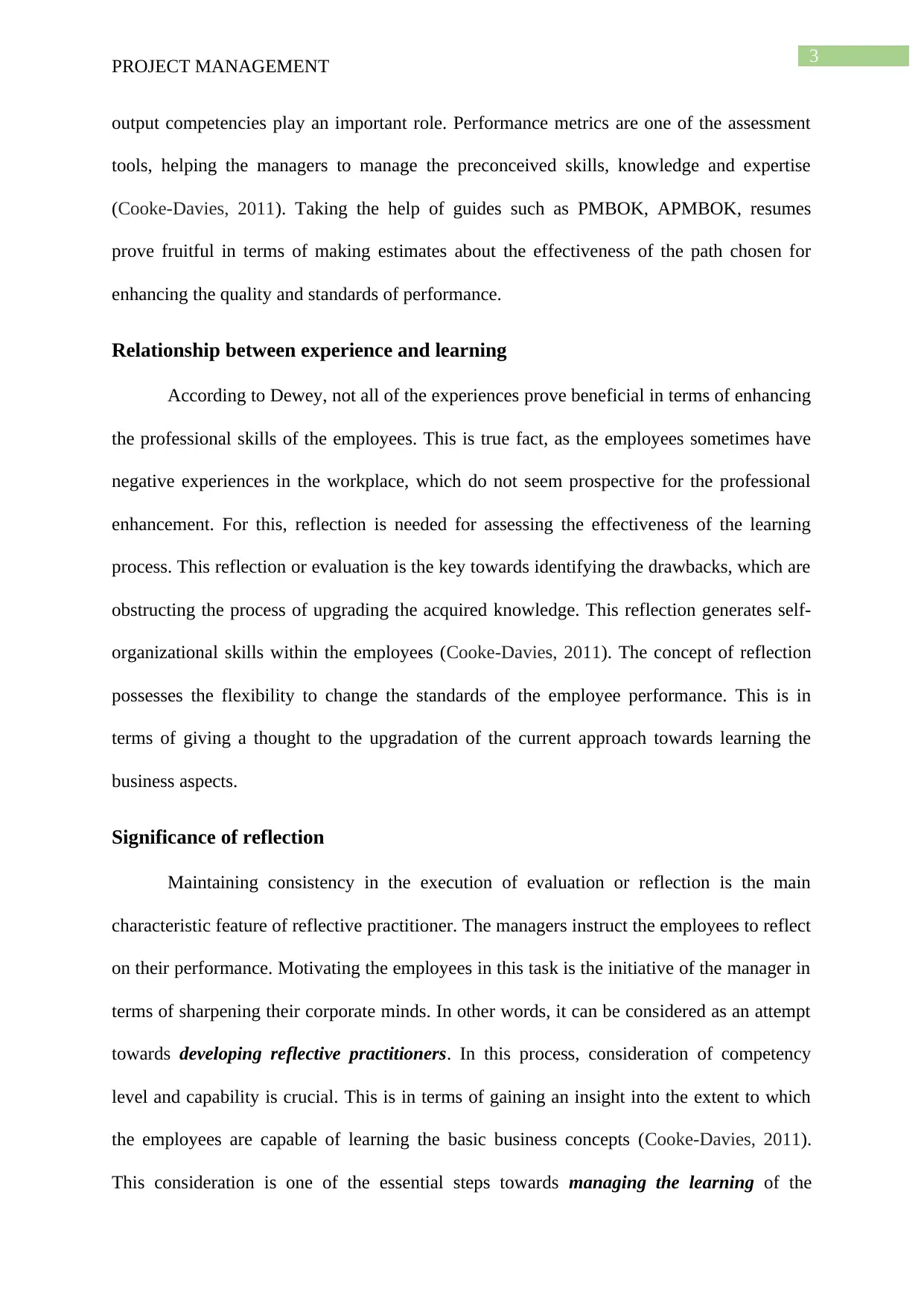
3
PROJECT MANAGEMENT
output competencies play an important role. Performance metrics are one of the assessment
tools, helping the managers to manage the preconceived skills, knowledge and expertise
(Cooke-Davies, 2011). Taking the help of guides such as PMBOK, APMBOK, resumes
prove fruitful in terms of making estimates about the effectiveness of the path chosen for
enhancing the quality and standards of performance.
Relationship between experience and learning
According to Dewey, not all of the experiences prove beneficial in terms of enhancing
the professional skills of the employees. This is true fact, as the employees sometimes have
negative experiences in the workplace, which do not seem prospective for the professional
enhancement. For this, reflection is needed for assessing the effectiveness of the learning
process. This reflection or evaluation is the key towards identifying the drawbacks, which are
obstructing the process of upgrading the acquired knowledge. This reflection generates self-
organizational skills within the employees (Cooke-Davies, 2011). The concept of reflection
possesses the flexibility to change the standards of the employee performance. This is in
terms of giving a thought to the upgradation of the current approach towards learning the
business aspects.
Significance of reflection
Maintaining consistency in the execution of evaluation or reflection is the main
characteristic feature of reflective practitioner. The managers instruct the employees to reflect
on their performance. Motivating the employees in this task is the initiative of the manager in
terms of sharpening their corporate minds. In other words, it can be considered as an attempt
towards developing reflective practitioners. In this process, consideration of competency
level and capability is crucial. This is in terms of gaining an insight into the extent to which
the employees are capable of learning the basic business concepts (Cooke-Davies, 2011).
This consideration is one of the essential steps towards managing the learning of the
PROJECT MANAGEMENT
output competencies play an important role. Performance metrics are one of the assessment
tools, helping the managers to manage the preconceived skills, knowledge and expertise
(Cooke-Davies, 2011). Taking the help of guides such as PMBOK, APMBOK, resumes
prove fruitful in terms of making estimates about the effectiveness of the path chosen for
enhancing the quality and standards of performance.
Relationship between experience and learning
According to Dewey, not all of the experiences prove beneficial in terms of enhancing
the professional skills of the employees. This is true fact, as the employees sometimes have
negative experiences in the workplace, which do not seem prospective for the professional
enhancement. For this, reflection is needed for assessing the effectiveness of the learning
process. This reflection or evaluation is the key towards identifying the drawbacks, which are
obstructing the process of upgrading the acquired knowledge. This reflection generates self-
organizational skills within the employees (Cooke-Davies, 2011). The concept of reflection
possesses the flexibility to change the standards of the employee performance. This is in
terms of giving a thought to the upgradation of the current approach towards learning the
business aspects.
Significance of reflection
Maintaining consistency in the execution of evaluation or reflection is the main
characteristic feature of reflective practitioner. The managers instruct the employees to reflect
on their performance. Motivating the employees in this task is the initiative of the manager in
terms of sharpening their corporate minds. In other words, it can be considered as an attempt
towards developing reflective practitioners. In this process, consideration of competency
level and capability is crucial. This is in terms of gaining an insight into the extent to which
the employees are capable of learning the basic business concepts (Cooke-Davies, 2011).
This consideration is one of the essential steps towards managing the learning of the
Paraphrase This Document
Need a fresh take? Get an instant paraphrase of this document with our AI Paraphraser
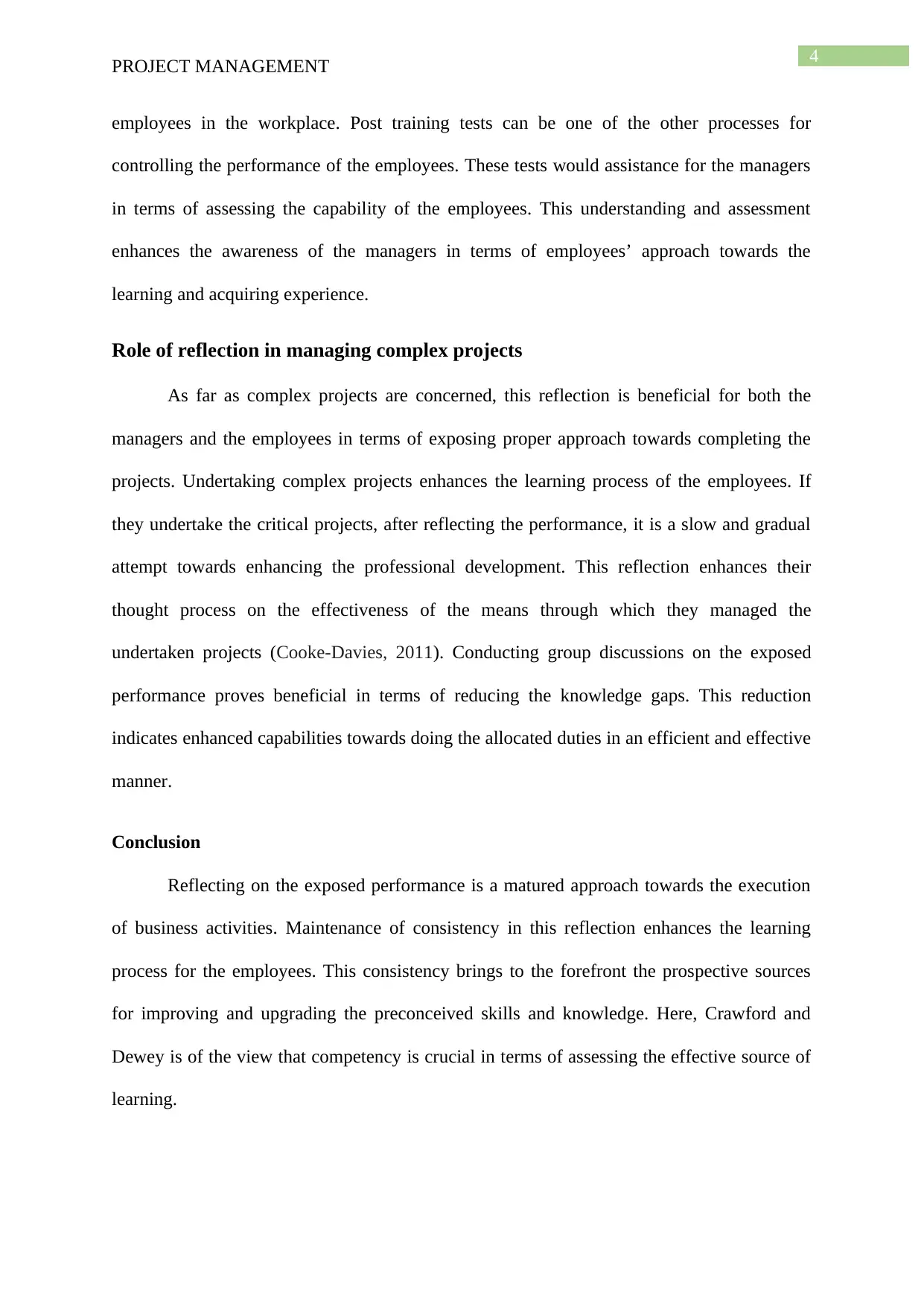
4
PROJECT MANAGEMENT
employees in the workplace. Post training tests can be one of the other processes for
controlling the performance of the employees. These tests would assistance for the managers
in terms of assessing the capability of the employees. This understanding and assessment
enhances the awareness of the managers in terms of employees’ approach towards the
learning and acquiring experience.
Role of reflection in managing complex projects
As far as complex projects are concerned, this reflection is beneficial for both the
managers and the employees in terms of exposing proper approach towards completing the
projects. Undertaking complex projects enhances the learning process of the employees. If
they undertake the critical projects, after reflecting the performance, it is a slow and gradual
attempt towards enhancing the professional development. This reflection enhances their
thought process on the effectiveness of the means through which they managed the
undertaken projects (Cooke-Davies, 2011). Conducting group discussions on the exposed
performance proves beneficial in terms of reducing the knowledge gaps. This reduction
indicates enhanced capabilities towards doing the allocated duties in an efficient and effective
manner.
Conclusion
Reflecting on the exposed performance is a matured approach towards the execution
of business activities. Maintenance of consistency in this reflection enhances the learning
process for the employees. This consistency brings to the forefront the prospective sources
for improving and upgrading the preconceived skills and knowledge. Here, Crawford and
Dewey is of the view that competency is crucial in terms of assessing the effective source of
learning.
PROJECT MANAGEMENT
employees in the workplace. Post training tests can be one of the other processes for
controlling the performance of the employees. These tests would assistance for the managers
in terms of assessing the capability of the employees. This understanding and assessment
enhances the awareness of the managers in terms of employees’ approach towards the
learning and acquiring experience.
Role of reflection in managing complex projects
As far as complex projects are concerned, this reflection is beneficial for both the
managers and the employees in terms of exposing proper approach towards completing the
projects. Undertaking complex projects enhances the learning process of the employees. If
they undertake the critical projects, after reflecting the performance, it is a slow and gradual
attempt towards enhancing the professional development. This reflection enhances their
thought process on the effectiveness of the means through which they managed the
undertaken projects (Cooke-Davies, 2011). Conducting group discussions on the exposed
performance proves beneficial in terms of reducing the knowledge gaps. This reduction
indicates enhanced capabilities towards doing the allocated duties in an efficient and effective
manner.
Conclusion
Reflecting on the exposed performance is a matured approach towards the execution
of business activities. Maintenance of consistency in this reflection enhances the learning
process for the employees. This consistency brings to the forefront the prospective sources
for improving and upgrading the preconceived skills and knowledge. Here, Crawford and
Dewey is of the view that competency is crucial in terms of assessing the effective source of
learning.
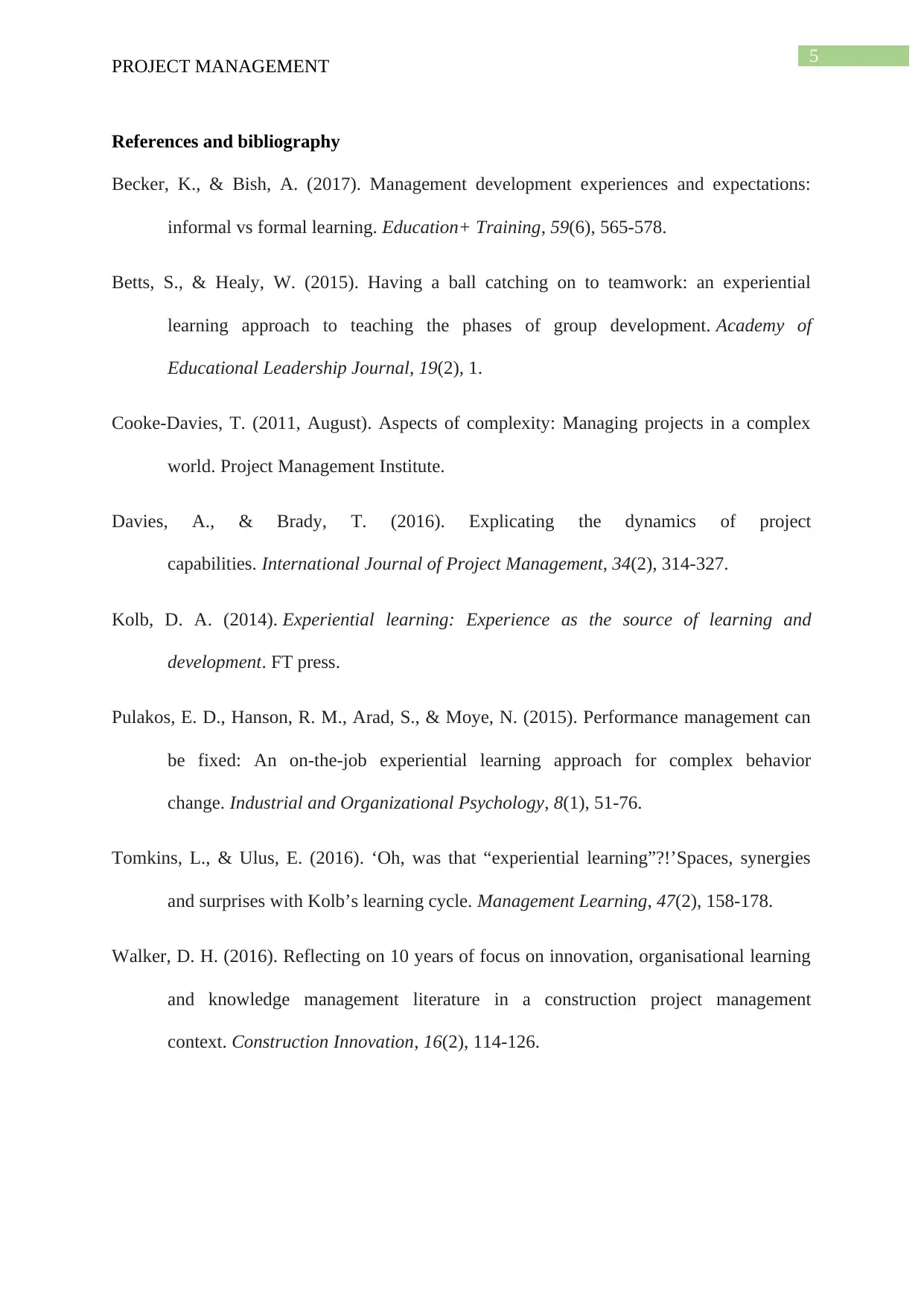
5
PROJECT MANAGEMENT
References and bibliography
Becker, K., & Bish, A. (2017). Management development experiences and expectations:
informal vs formal learning. Education+ Training, 59(6), 565-578.
Betts, S., & Healy, W. (2015). Having a ball catching on to teamwork: an experiential
learning approach to teaching the phases of group development. Academy of
Educational Leadership Journal, 19(2), 1.
Cooke-Davies, T. (2011, August). Aspects of complexity: Managing projects in a complex
world. Project Management Institute.
Davies, A., & Brady, T. (2016). Explicating the dynamics of project
capabilities. International Journal of Project Management, 34(2), 314-327.
Kolb, D. A. (2014). Experiential learning: Experience as the source of learning and
development. FT press.
Pulakos, E. D., Hanson, R. M., Arad, S., & Moye, N. (2015). Performance management can
be fixed: An on-the-job experiential learning approach for complex behavior
change. Industrial and Organizational Psychology, 8(1), 51-76.
Tomkins, L., & Ulus, E. (2016). ‘Oh, was that “experiential learning”?!’Spaces, synergies
and surprises with Kolb’s learning cycle. Management Learning, 47(2), 158-178.
Walker, D. H. (2016). Reflecting on 10 years of focus on innovation, organisational learning
and knowledge management literature in a construction project management
context. Construction Innovation, 16(2), 114-126.
PROJECT MANAGEMENT
References and bibliography
Becker, K., & Bish, A. (2017). Management development experiences and expectations:
informal vs formal learning. Education+ Training, 59(6), 565-578.
Betts, S., & Healy, W. (2015). Having a ball catching on to teamwork: an experiential
learning approach to teaching the phases of group development. Academy of
Educational Leadership Journal, 19(2), 1.
Cooke-Davies, T. (2011, August). Aspects of complexity: Managing projects in a complex
world. Project Management Institute.
Davies, A., & Brady, T. (2016). Explicating the dynamics of project
capabilities. International Journal of Project Management, 34(2), 314-327.
Kolb, D. A. (2014). Experiential learning: Experience as the source of learning and
development. FT press.
Pulakos, E. D., Hanson, R. M., Arad, S., & Moye, N. (2015). Performance management can
be fixed: An on-the-job experiential learning approach for complex behavior
change. Industrial and Organizational Psychology, 8(1), 51-76.
Tomkins, L., & Ulus, E. (2016). ‘Oh, was that “experiential learning”?!’Spaces, synergies
and surprises with Kolb’s learning cycle. Management Learning, 47(2), 158-178.
Walker, D. H. (2016). Reflecting on 10 years of focus on innovation, organisational learning
and knowledge management literature in a construction project management
context. Construction Innovation, 16(2), 114-126.
⊘ This is a preview!⊘
Do you want full access?
Subscribe today to unlock all pages.

Trusted by 1+ million students worldwide
1 out of 6
Related Documents
Your All-in-One AI-Powered Toolkit for Academic Success.
+13062052269
info@desklib.com
Available 24*7 on WhatsApp / Email
![[object Object]](/_next/static/media/star-bottom.7253800d.svg)
Unlock your academic potential
Copyright © 2020–2026 A2Z Services. All Rights Reserved. Developed and managed by ZUCOL.





